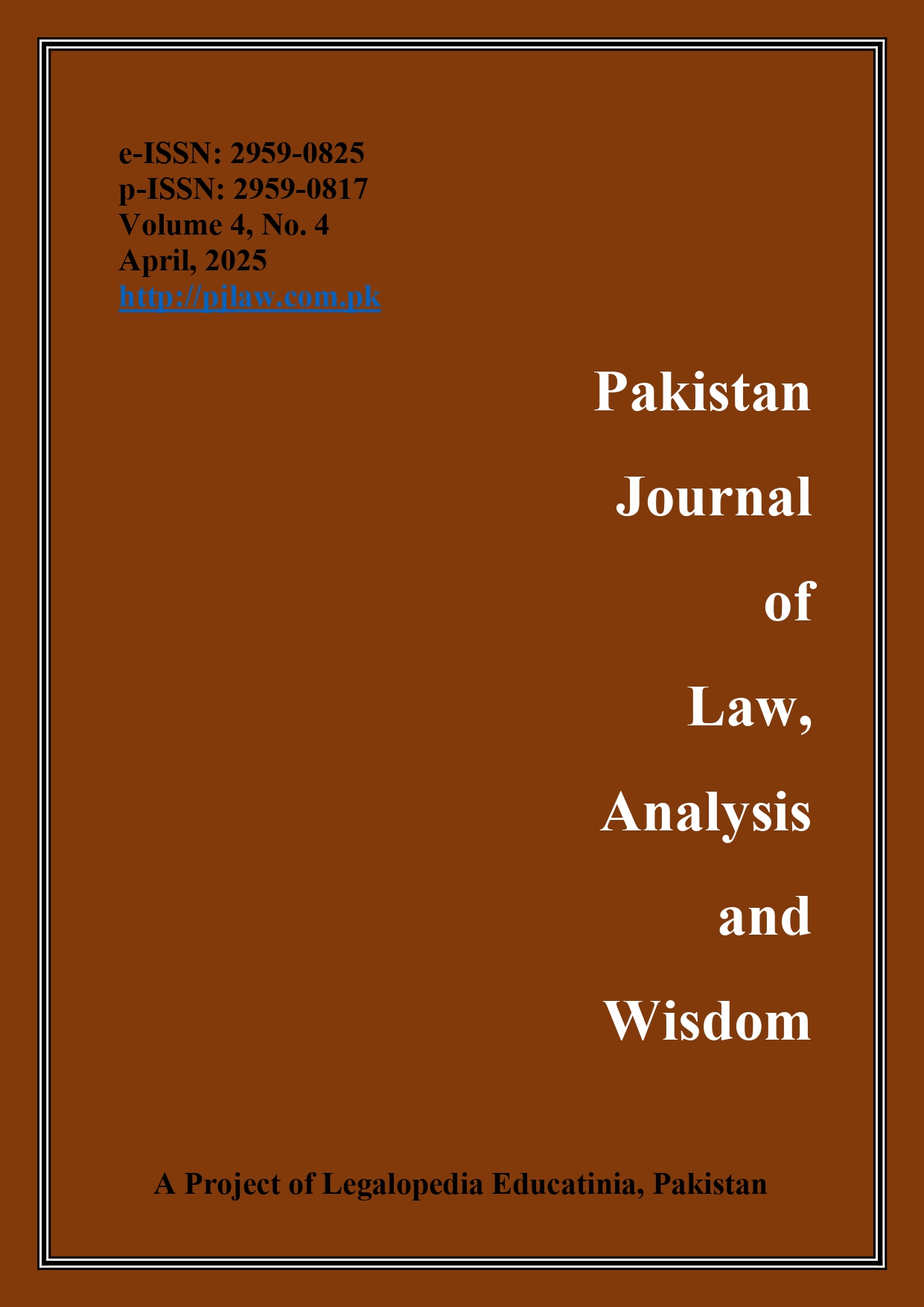Legal Necro-politics: Bhutto’s Hanging and the Moral Collapse of Capital Punishment
Keywords:
Capital Punishment, Rule of Law, misuse of power, effective remedies, The Bhutto Case, Pakistan, UKAbstract
Capital Punishment has not only been in effect since the formation of the Islamic Republic of Pakistan, but has also been, on multiple prominent occasions, abused by certain powerful entities of the State with ulterior motives, of which the most notable landmark was The Bhutto case 1979. The lack of Rule of Law in Pakistan is a major concern which is further fueled and aggravated by the distressing misuse of power; in such a State, the mere existence of capital punishment warrants an immense level of endangerment to the life of any person, party or group of individuals who attempt to bring about change by raising a voice or by forming or displaying resistance against a tyranny ridden regime, that may seem “political” at the surface level but musn’t be took at par value, because in actuality it is one that is puppetered at the hands of the establishment, alongside their associated agencies, making it out to be nothing short of unequivocally dictatorial in nature. This case study aims to highlight the benefits of abolishing capital punishment in Pakistan and the effects it shall have on such a country, by putting the Bhutto Case under microscopic observation. Furthermore, in a civilised society, laws evolve, as do the punishments, leading to being made progressive and humane with the passage of time. Many advanced societies of the world, such as that of England and Wales, have abolished the use of capital punishment through law reforms, preventing its misuse. In turn, they devised effective remedies by providing alternative punishments that holistically yield a more fruitful outcome for society as a whole by focusing more on reformation through penalisation rather than blatantly putting an end to the life of the convicted individual. However, quite the opposite trend has been observed in the laws of the Islamic Republic of Pakistan: initially, the capital penalty was only to be used as a sentence for treasonous acts against the State as well as the offence of murder, whereas, in present day, this number has risen from a mere 2 to 33 crimes that are punishable by death, hence having a regressive effect in the evolution of the State’s law. This study further aims to show how abolishing capital punishment can be in the best interest of the State by viewing the improvement this reform has had in countries where it was implemented, focusing primarily on the UK.
References
Amnesty International UK, ‘Juvenile Offender Shafqat Hussain Executed in Pakistan’ (5 June 2015) https://www.amnesty.org.uk/shafqat-hussain-pakistan-execution-death-row
Amnesty International, Abolitionist and Retentionist Countries as of December 2024 (April 2025) https://www.amnesty.org/en/documents/act50/9240/2025/en/
Amnesty International, Amnesty International 2021 Report https://www.amnesty.org/es/wp-content/uploads/2021/05/ASA3316162015ENGLISH.pdf
Amnesty International, Death Sentences and Executions in 2023 (29 May 2024) Index No. ACT 50/7952/2024 https://www.amnesty.org/en/documents/act50/7952/2024/en/
Bhutto B, Daughter of the East: An Autobiography (2008) https://archive.org/details/daughterofeastau0000bhut
Death Penalty Information Center, The Death Penalty in 2023: Year End Report (1 December 2023) https://deathpenaltyinfo.org/research/analysis/reports/year-end-reports/the-death-penalty-in-2023-year-end-report
Gordon A, ‘Executions in Iran Pushed Global Number to Eight-Year High, Report Says’ Time (29 May 2024) https://time.com/6983058/global-executions-iran-amnesty-international/
Justice Project Pakistan, List of Offences Punishable by Death in Pakistan https://data.jpp.org.pk/en/entity/ngo5vvasxsr
Le Monde, ‘Amnesty International Report Shows Executions Worldwide in 2023 Rose to an 8-Year High’ (29 May 2024) https://www.lemonde.fr/en/international/article/2024/05/29/an-amnesty-international-report-shows-executions-worldwide-last-year-were-the-highest-since-2015_6672964_4.html
Naseer G, ‘Judicial Activism: Authority or Autocracy? Unravelling the Role of Judiciary in Pakistan’ (31 July 2024) Pakistan Journal of Law https://pjlaw.com.pk/index.php/Journal/article/view/v3i7-31-50
Pakistan Penal Code (Act XLV of 1860)
R v Bentley (Derek) [1993] 1 WLR 1461 (CA)
R v Ellis (Ruth) [2003] EWCA Crim 3556 (CA)
R v Evans (Timothy) [1966] 2 QB 302 (CA)
R v McIlkenny and Others [1991] 1 All ER 913 (CA)
R v Richardson and Others [1989] 3 WLR 461 (CA)
Schofield V, Bhutto, Trial and Execution (Weidenfeld & Nicolson 1979)
World Coalition Against the Death Penalty, Abolitionist and Retentionist Countries: Facts and Figures 2024https://worldcoalition.org/wp-content/uploads/2024/07/FactsFigures2024_EN_Final.pdf
Zulfikar Ali Bhutto v The State (1979) 1 SCMR 279
Downloads
Published
Issue
Section
License
Copyright (c) 2025 Mariam Tahir

This work is licensed under a Creative Commons Attribution-NonCommercial 4.0 International License.











 LEGALOPEDIA EDUCATINIA (PVT) LTD
LEGALOPEDIA EDUCATINIA (PVT) LTD